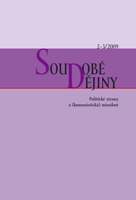Rozděleni minulostí Československá sociální demokracie v letech 1989–1992
The Pasts That Divide: The Czechoslovak Social Democratic Party, 1989–92 Tomaš Zahradniček
Author(s): Tomáš Zahradníček Subject(s): History
Published by: AV ČR - Akademie věd České republiky - Ústav pro soudobé dějiny
Summary/Abstract: In the mid-1990s the Czechoslovak Social Democratic Party (Československa strana socialnědemokraticka), next to the Civic Democratic Party, became the strongest political force in the country. This article is concerned with the question of why it was unable after the Changes of November and December 1989 to influence the Czech public and become involved in the political debates about the Communist past. The author considers who actually were the first actors in Social Democratic politics, and stresses the role played by the most important initial differences between them in their attitudes towards tradition and certain personal lives before November 1989. According to these differences, the author divides the Social Democrats into three main groups: the ‘restitution group’, the ‘continuity group’, and the ‘new group’. The numerically largest group, the ‘restitution group’ (led by Slavomir Klaban, born in 1922), attempted to restore the Social Democratic Party after the fortyyear break in its activity. In doing so, this group based itself on the bitter memory of the pro-Communist faction’s having taken control of the party in 1948, and on the repressive measures that followed. The ‘continuity group’, comprising exile Social Democrats (led by Karel Hruby, born 1923, and Jiři Loewy, 1930–2004) and ‘independent Socialists’ who had signed Charter 77 (led by Rudolf Battěk, born 1924, and Jaroslav Meznik, 1928–2008) had the experience of many years of active resistance to the Communist regime. Apart from them, new activists, who previously had practically nothing in common with the party, joined the Social Democrats after the fall of the ‘ancien regime’. Amongst them were former Communists, some of whom were active in the Obroda reform club. These fundamental starting points ran up against the actual position of the Social Democrats after the Changes of late 1989. This position was determined by several external factors: the Civic Forum did not wish to see political parties develop, the public quickly and for the long-term abandoned the slogans of Socialism (even if reformed), and the Communist Party was able to survive in the new circumstances and sought to represent not just its traditional members, but all left-wing voters. This situation required political action from the Social Democrats in the space between the Civic Forum and the Communist Party of Bohemia and Moravia, for which the nascent party was ill prepared. The first elected leadership under the former exile Social Democrat functionary Jiři Horak (1924–2003) had a weak position and many other figures of authority, from diverse political milieux, struggled for preeminence, seeking to use the Social Democratic name to assert their own views. But in fact any topic that was related to the past divided them. That changed after the election of Miloš Zeman (born 1944) as head of the party in February 1993.
Journal: Soudobé Dějiny
- Issue Year: XVI/2009
- Issue No: 02-03
- Page Range: 333-358
- Page Count: 26
- Language: Czech

